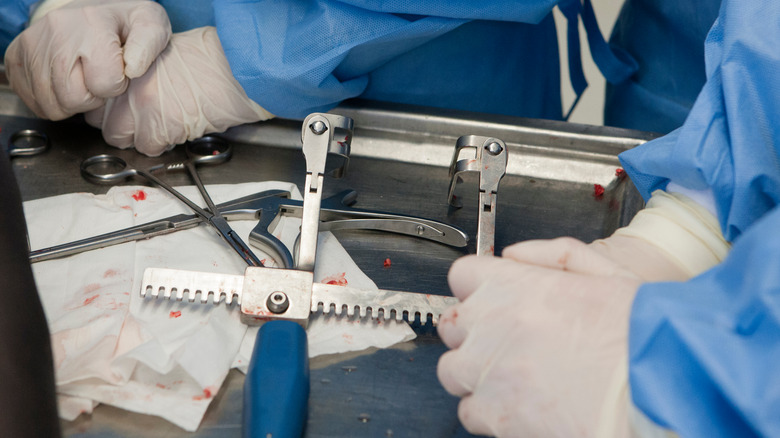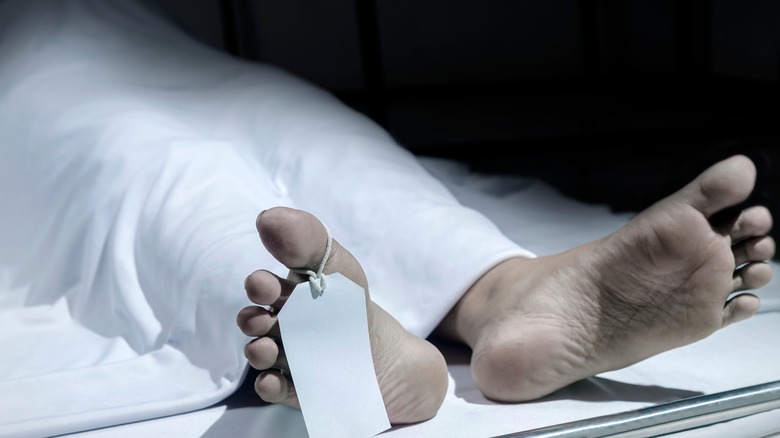The Disturbing Case Of The Man Who Woke Up During His Autopsy
For all of the advances we've made in science and medicine over the centuries, one aspect of life — and a seemingly basic and fundamental one at that — that we don't fully understand is death. That's because the signs that we rely on to tell us if someone is alive — respiration, brain activity, heart activity — can sometimes be so imperceptible, even to modern machinery, that someone can give the appearance of being dead even though they are technically alive (more on this in a moment). And this isn't just theoretical, either; more than one person has woken up at their own funeral, and others have woken up in the morgue.
And while being buried alive or put into the crematory alive may sound like a fate worse than death, there's another gruesome aspect to this concept that you may not have thought of: waking up during your own autopsy. It's happened at least once, and much like waking up during surgery, it's every bit as gruesome as it sounds.
'I Woke Up Because The Pain Was Unbearable'
A Venezuelan man named Carlos Camejo had an exceptionally bad day in 2007, according to an English translation (via Google) of the Mexican newspaper El Universal, which was itself citing a Venezuelan newspaper of the same name (archives of the original Venezuelan article appear not to exist on the internet). The 33-year-old man crashed his motorcycle into a parked vehicle, setting into motion a series of failures that would be comical if they weren't so gruesome (and with a little larceny thrown in, to boot).
Paramedics at the scene pronounced him dead — which, by the way, is not something that's done in all 50 states in the U.S., according to Firefighter Now – only a doctor can make such a determination. Once at the morgue, his wife claims, he was left in a corridor, "with the autopsy order tucked into a pants pocket," she claimed.
It got worse. As the team was preparing to open him up, the doctor noticed that Camejo was bleeding — something that dead bodies do not do — and started stitching up his face. "I woke up because the pain was unbearable," he said, via Reuters.
In an added insult, Camejo alleges that someone in the morgue relieved him of his pocket money: about 600,000 bolivars, which at the time was worth about 3,000 Mexican pesos (about $150 at current exchange rates).
Life After 'Death' Is More Common Than You Think
Ideally, when someone dies in 2022, particularly if they die in a developed, Western location, several things are going to happen, including being (for a time anyway) in a morgue, the body being prepared for burial or cremation, and the actual burial or cremation. However, more than once someone has been at one stage in that process only to turn up alive. As The Guardian reports, it happens rather frequently, including to a Polish woman who had even spent some time in a refrigerator, and it happened to a Kenyan man, in a case in which the newspaper notes that it caused the employees at the facility to "take to their heels, screaming." People have also woken up at their own funerals, including a 3-year-old Mexican girl, according to the New York Post, but sadly she died just hours later.
Before modern medicine made the barrier between life and death less of a guessing game than it appears to be now, all bets were off. So afraid were people of being buried alive — and not unjustifiably so, it turns out — that an inventor created a system so that the deceased could ring a bell if they woke up in a coffin. "Often people were pronounced dead and they weren't really. You would wake up and you are in your grave. It makes the hair on your neck stand up," said historian John Miller, via the Parkersburg News and Sentinel.
The Guessing Game Of Death
You can see how, centuries ago, the risk of being buried alive was real. The signs that physicians use to determine if someone is alive — respiration, brain activity, and so on — are sometimes faint, even to modern machinery. So it's no surprise that, as historian John Miller told the Parkersburg News and Sentinel, in pre-modern days anyone with a faint-enough pulse or respiration could be presumed dead, even though they weren't, and risk being buried alive, or thrown into an open pit with the actual dead (such as in the case of a contagious plague). Ideally, modern telemetry and related medical devices should put us out in front of that, but as we've already seen, mistakes can be made and people have fallen through the cracks.
And then there's the matter that the line between life and death isn't always obvious and razor-thin. The Guardian explains, any one thing that could indicate death, such as the lack of a heartbeat, is actually just one of many processes that have to take place as the person journeys from life to death. "Even within the medical community there is debate over what really constitutes death, and it is seen less as a single event and more as a process," notes writer Carla Valentine.



